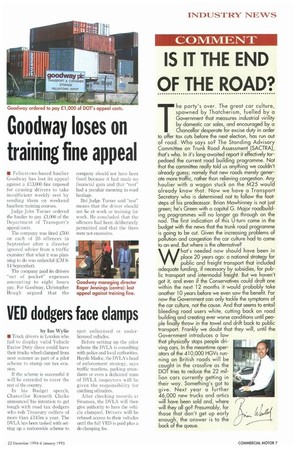IS IT THE END OF THE ROAD?
Page 9

If you've noticed an error in this article please click here to report it so we can fix it.
The party's over. The great car culture, spawned by Thatcherism, fuelled by a Government that measures industrial virility by domestic car sales, and encouraged by a Chancellor desperate for excise duty in order to offer tax cuts before the next election, has run out of road. Who says so? The Standing Advisory Committee on Trunk Road Assessment (SACTRA), that's who. In it's long-awaited report it effectively torpedoed the current road building programme. Not that the committee really told us anything we couldn't already guess; namely that new roads merely generate more traffic, rather than relieving congestion. Any haulier with a wagon stuck on the M25 would already know that. Now we have a Transport Secretary who is determined not to follow the footsteps of his predecessor. Brian Mawhinney is not just green; he's Green with a capital G. Major roadbuilding programmes will no longer go through on the nod. The first indication of this U-turn came in the budget with the news that the trunk road programme is going to be cut. Given the increasing problems of pollution and congestion the car culture had to come to an end. But where is the alternative?
hat's needed now should have been in place 20 years ago: a national strategy for public and freight transport that included adequate funding, if necessary by subsidies, for public transport and intermodal freight. But we haven't got it, and even if the Conservatives could draft one within the next 12 months it would probably take another 10 years before we even saw the benefit. For now the Government can only tackle the symptoms of the car culture, not the cause. And that seems to entail bleeding rood users white, cutting back on road building and creatiny, ever worse conditions until people finally throw in the towel and drift back to public transport. Frankly we doubt that they will, until the Government introduces a law that physically stops people dri ving cars. In the meantime oper ators of the 410,000 HGVs running on British roads will be caught in the crossfire as the DOT tries to reduce the 22 million cars currently getting in their way. Something's got to give. Next year a further 46,000 new trucks and attics will have been sold and, where will they all go? Presumably, for those that don't get up early enough, the answer is to the back of the queue.




















































































































